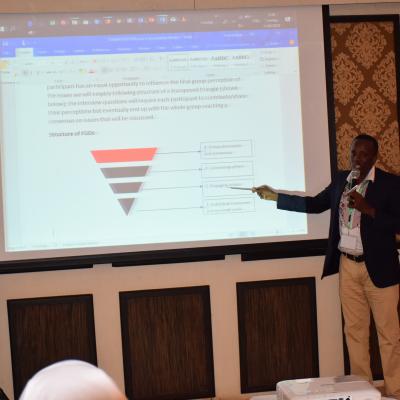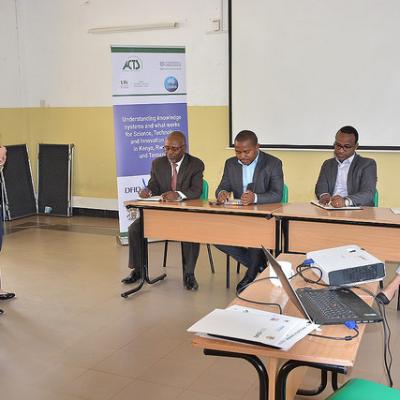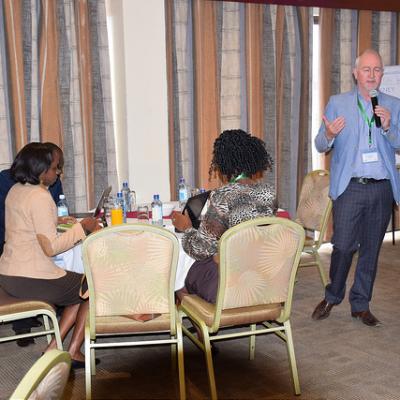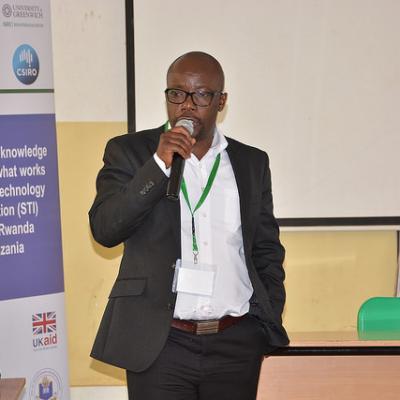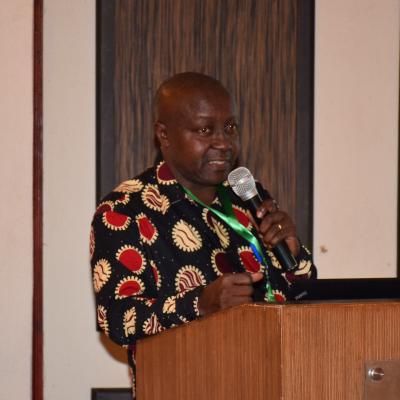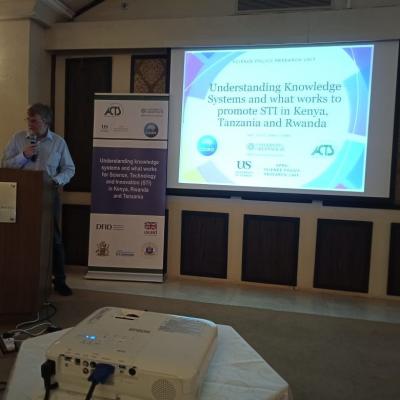Introduction
The University of Rwanda (UR) in partnership with the African Center for Technology Studies (ACTS) held a one day applied workshop at University of Rwanda on the 25th of July, 2018 to mark the inception of the Knowledge Systems Innovation (KSI) project. KSI is a project funded by the United Kingdom Department for International Development (DFID) through the East Africa Research hub with lead partners from the Natural Resources Institute (NRI), at the University of Greenwich, the Science Policy Research Unit (SPRU) at the University of Sussex, the African Center for Technology Studies, and the Commonwealth Scientific and Industrial Research Organization (CSIRO).
The aims of the workshop was (i) creating awareness about the project, its intentions and relevance to the country development processes; (ii) getting feedback from stakeholders on the design and expectations of the project; (iii) exploring opportunities for linking the project to other ongoing government initiatives (iv) exploring options for enhanced uptake strategy, and (v) to ensure that in-country views, needs and capabilities of teams/stakeholders are well integrated into the study design and associated outputs and outcomes.
Opening remarks were given by the Vice Chancellor, Academic Affairs and Research from UR Prof. Ijumba who welcomed the project’s initiative to improve Science, Technology and Innovation (STI) in Rwanda. Prof. Ogada the Executive Director, ACTS also gave his opening remarks and mentioned that STI can be used to stimulate economic development of the country and to dissect the knowledge systems. He congratulated UR for developing an Intellectual Property (IP) policy and structure to manage innovation, which is currently quite strong at the university. He affirmed ACTS’s role as that of an African Science and Technology think tank that supports institutions to develop and harness STI development and welcomed more partnerships and collaborations with ACTS.

Workshop participants –Knowledge Systems Innovation project in Rwanda
Rwanda Innovation Policy Environment
The Rwanda STI policy was approved in 2005 and founded on 4 principles of (i) knowledge acquisition, (ii) deepening knowledge creation (iii) knowledge transfer, and (iv) innovation and entrepreneurship culture. To enhance knowledge generation, the policy focuses on areas such as critical thinking and learning by doing. This has seen so far the establishment of the Technical Vocational Educational and Training (TVETs) Institutions aimed at creating 200,000 off-farm jobs. Mike Hughes from the Ministry of Education, Rwanda attested to these facts.
Other establishments include Centers of Excellence (CoE) involved in knowledge generation with specialized mandates to develop high level academic and research capacity to address challenges facing Rwanda and the region. They span from CoE in Biodiversity and Natural Resources Management which provides knowledge-based approaches for sustainable development; CoE in Global Climate Observatory in Partnership with Massachusetts Institute for Technology Studies (MIT) and Common Market for Eastern and Southern Africa (COMESA), ICT, Biomedical Engineering, Health Supply Chain Management, Partner Institute for International Centre of Theoretical Physics and the African Institute for Mathematical Sciences. Mike Hughes mentioned that Rwanda is also privileged to host Africa Higher Education Centers of Excellence (ACE II) funded by World Bank. These centers of excellence will contribute to the development of critically needed skills and contribute to the national and regional socio-economic development. Another initiative that is advancing science and technology in Rwanda is the Kigali Innovation City, which is aimed at linking knowledge generated by academia with private sectors, including CoE in ICT to attract private sector companies to establish the Kigali Innovation City. Other initiatives include the Rwanda Education and Research Networks (RWEDNET) that link education and research; Fabrication laboratory (FabLAb); the International Network for Government Science Advice (INGSA) and the Network for the Coordination and Advancement of Sub-Saharan Africa-EU Science Technology Cooperation, whose main aim is to enhance collaboration and provide a platform for policy exchange and advice on priority areas for research funding, capacity building and research across diverse global science advisory organizations and national systems.
Mapping knowledge systems in Rwanda
The National Industrial Research and Development Agency (NIRDA) a government agency aimed at providing agency to improve competitiveness has proved to be one of the models of a national style of innovation. NIRDA works to leverage the capacity of industry and academia by employing a model where academia works directly with industry for example by using applied research to promote commercialization of products. “NIRDA is in charge of looking at technological solutions that are appropriate and mainly focuses on technological adaptation and acquisition” These were Ms. Kampeta’s remarks who presented on mapping work on knowledge systems in Rwanda. NIRDA, she indicated also provides information to industry using technology by using a value-chain approach and advice on the technology that is only relevant to Rwanda. For this, NIRDA looks at case studies to map out what is referred to as “Feel Fair” looking at what has worked and what did not work. Its approach is a holistic one that focuses on academia, private as well as the hybrid model of academia and private. Ms. Kampeta emphasized the need of creating new value chains for Rwanda to move to a high income country as well as achieve the 4th industrial revolution. In addition, the government will need to work with the Centers of Excellence (CoE) while industry will need to work with the universities, she emphasized.
Ms. Kampeta outlined the challenges in Rwanda’s knowledge system as that which is heavily pegged on academia with little focus on Research and Development (R&D) for firms and by the firms a sentiment that was also echoed by Mike Hughes. She mentioned that the understanding of the Knowledge Systems (KS) in Rwanda is that R&D is mostly for research and the mindset[1] needs to shift for R&D to be for private sector and development as industrial innovation occurs within firms and not in research. The level of knowledge and innovation happening on firms is often underestimated. There is therefore the need to create institutional linkages and to incentivize agencies involved in innovation which has a cost implication. Further, incentives should be given to researchers to have the end product that goes beyond publication. The industry needs to also understand that R&D and innovation is not only the business for academia but their business as well especially in new product development. Challenging the academia, she emphasized that there is need to see the link between R&D investments and Rwanda’s Gross Domestic Product (GDP) to increase funding in research by the government.
To grow the per capita income in Rwanda, industrial growth is expected at 13% per annum for the next 7 years while agriculture will be expected to grow at 7-8%. This growth, expected to come from the industry should not assume the new normal but instead focus on what role R&D and applied research will play for industry and especially in the development of human and capital skills. Incentivizing visiting lecturers coming from the industry are just but a proposed approach on academia and industry linkages while encouraging local innovation through increased funding for indigenous knowledge. There were interesting questions about what the industry is giving in the innovation process as well as challenges in the innovation process while other concerns were in regards to return on investments on R&D. How come R&D does not translate into GDP? There was wide recognition of industry to commit to output and the affirmation that the innovation paradox boils down to firm capabilities. Challenges in the innovation process were identified as Intellectual Property (IP) protection but this was currently underway with the Rwanda IP office. “Other countries have done well when it comes to innovation and Rwanda could do well possibly” Kampeta observed. Participants challenged her on what’s well and how does it look like. She observed that success looked like Malaysia which had similar problems and yet pushed academia to produce patents by collaborations between industry and academia.
She further challenged the KSI project to come up with recommendations on KS investments mentioning that not much research is available in Knowledge System (KS) as well a little access to such knowledge. She suggested having a one portal knowledge emphasizing on research institutions collaboration across borders on all research, this was also proposed in the Kenya's stakeholder’s workshop.
Rwanda’s Vision 2020
Dr. Marie-Christine presented on the Rwanda’s vision 2020 whose focus is on transforming Rwanda’s current agriculture-based economy to a knowledge-based economy (KBE) (an economy that recognizes knowledge as a source of competitiveness, increasing importance of science, research, technology and innovation in knowledge creation) hence need to invest in human resource and capability building. She outlined Rwanda’s principle asset –its people-, a requisite for industrial development, hence more emphasis on investments in skills development and human capital in Rwanda. The country’s strong foundation of science and technology is a great enabler for its transformation to a KBE. The country is also focusing on education as a basis for KBE and specifically on Science, Technology, Engineering and Mathematics (STEM) to enable the next generation of innovators. This has seen Rwandese attitude towards education and especially TVETs change as the government supports their absorption through the National Employment Program (NEP). The statistics do support this-after secondary education, 40% of the students continue to university while the 60% continue with TVETs. Questions were raised on assessing the success of KS contribution to the vision and the success factors in place to measure this. The role of the civil society in knowledge management and in the vision was also questioned as well as why Rwanda’s 1st stride was in knowledge management in Knowledge System (KS). It was acknowledged that the country needed to build on a KS that is very competitive and relies on models such as Singapore, Hongkong and Korea.
Panel Discussion-Understanding of the Knowledge Systems
During the workshop a panel discussion was held moderated by Prof. Joana Chataway of SPRU. The panelists featured persons from the university, national commission for science and technology and think tank organizations. They shared their experiences and their understanding of the knowledge systems. KS was perceived as focusing on knowledge acquisition and development, knowledge that not only provides solutions but also pushes for the frontiers of what they want (locally and globally) and knowledge that helps academic students produce outcomes and outputs. The panelists indicated that the KS should address Rwanda’s priority sectors which include; food and nutrition security, health, ICT, environment, natural resources and manufacturing. A knowledge system with policy options that can link to innovation was discussed. The best example provided was the plastic ban policy where trees are grown for agroforestry while using banana leaves as potting materials. It was discussed that such initiatives that involves systems-thinking should be encouraged to ensure a shift from just the ordinary thoughts that contributing to GDP is enough to meet socio-economic and environmental goals or either. The discussion concluded by asking questions on best practices to link industry with academia and the appropriate framework for university-industry linkage that would work for each country. Strengthening industries and institutions while creating strong partnerships was highly recommended. What else needs to done? Is open data something that can be thought about? These were the concluding questions on the panel discussion.
Way forward
Dr. Joanes Atela from ACTS gave closing remarks by outlining key messages from the discussions and providing a series of steps for the next activities. He indicated that the consultation process will continue through more in-depth discussions around the project and topics. Rwanda formed a Community of Practice (CoP) to continue informing the processes and the steps taken for the implementation of ideas generated by KSI project. Dr. Joanes mentioned that new knowledge generated and projects that demonstrates their interest will be shared for their input under the CoP. Other follow-up activities as indicated by Dr. Joanes will include interviews and discussions around STI and KS as well as sharing of the initial project reports such as the workshop proceedings. This platform physically formed will also exist virtually through social-media platforms while fostering informal connections that will build a knowledge base in STI for Rwanda to contribute to socio-economic development.
About the author
Nora Ndege is a research fellow-knowledge system and is based at the African Centre for Technology Studies. She has experience in research and bias towards agricultural innovations and knowledge systems. Twitter @norandege
[1] The Global Innovation Index ranked Rwanda as No. 83 out of 125 and the major issue to this was the mind set where people associate STI with academia and not innovation on firms.

